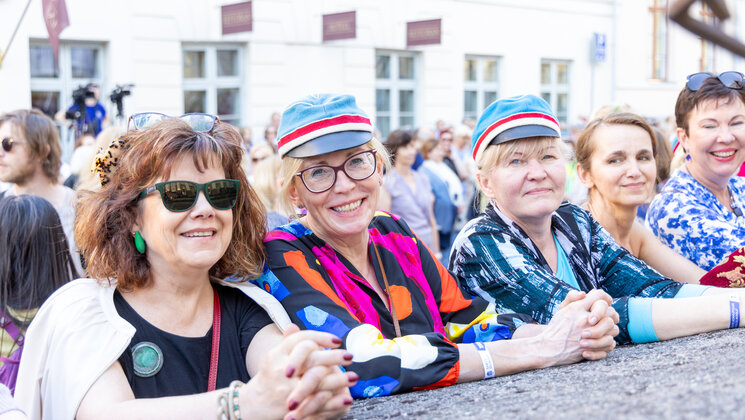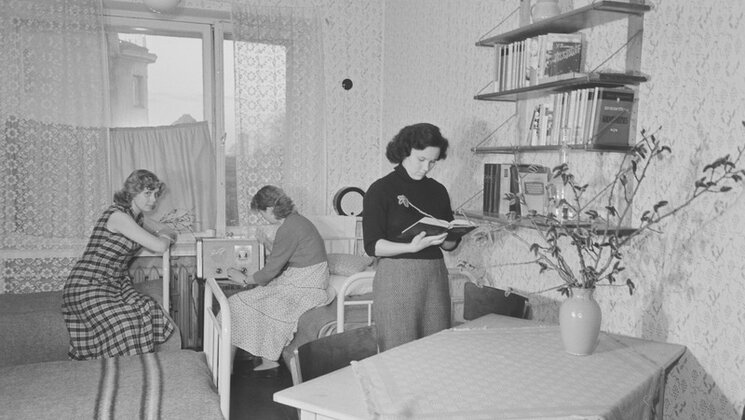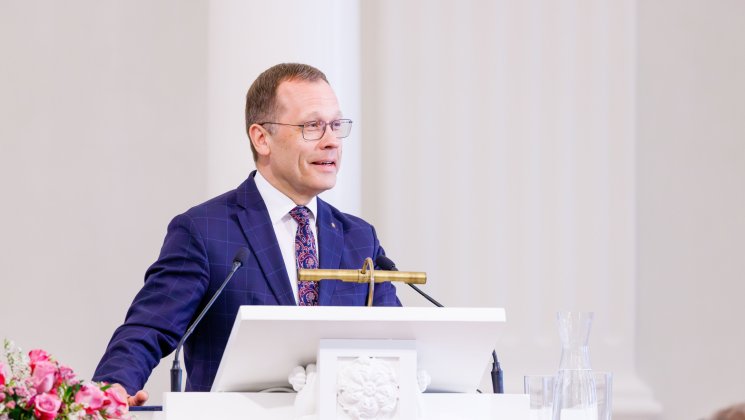Alumni stories. Mika Keränen: the writer whose heart beats to the rhythm of Tartu

Getting ready for the spring get-together, Lauri Räpp meets with well-known, colourful alumni of the University of Tartu to talk with them about memories of their time at the university, the spirit of their alma mater and the reasons why they keep coming back. Writer Mika Keränen talked to him about his time at the university, the real-life members of the Secret Society of Souptown and the magic of language.
When Mika came to study in Tartu, he had not yet developed an interest in the Estonian language. The young man was more attracted to forestry, which he began studying in 1993 at the Estonian Agricultural University, now the Estonian University of Life Sciences. But then, in the first year of his studies, something clicked in his head and activated the language machine, he recalls with a chuckle. Mika thinks this weird machine is a prerequisite for becoming a poet or writer.
As the language machine started, his heart began beating in rhythm with Tartu. It became clear that Tartu would become his hometown, and with it came a strong desire to learn Estonian. For example, why move to Latvia or the Netherlands and stick to speaking English there? For him, it is natural to live in Estonia, speaking Estonian. Thus, a year later, Mika became a student at the University of Tartu, majoring in Estonian as a foreign language. The rest is (literary) history.
When he enrolled at the university, he hoped to find himself in the midst of an academic atmosphere. The air was thick with it and Mika enjoyed it to the full. Also, there was a powerful bouquet in the air from his fellow students, predominantly Estonian Russian women, in the programme. Mika adds with a laugh that he did not need to apply cologne himself, because the cloud of scent was truly breath-taking. Speaking of fellow students, it became clear quite quickly who loved fiction and the beauty of language and who was interested in language as a system. A man with an excellent linguistic mind, whom Mika still calls Peeter, became his best university friend. The Bulgarian, whose real name is Petar Kehayov, has now become a Professor of Finnic Languages at the University of Tartu.
Mika’s university friends were folklore researchers and included, among others, Ergo-Hart Västrik and Kalle Voolaid. The three of them were also united by being parents. Mika explains that the children of friends also became the core of the “The Secret Society of Souptown”, his popular children's book. Tuule became Sadu, Evamaria became Mari, and Retti became Reelika. Naturally, Mika was also inspired by the learning environment and professors. They all have their place in his creative work.
Talking about professors and lecturers makes Mika’s eyes light up. They were the gurus in their field! Ago Künnap, Jüri Valge, Matti Erelt, Elle Vaimann, Sirje Rammo, he lists them. Their passion for their field infected the students. If we draw parallels with today, going to their lectures was far more interesting than passing time on Netflix. It was the lecturers who kept Mika on track. And it wasn’t easy to manage at university, he admits, and he is glad he still got his diploma.
One of the most colourful professors was Ago Künnap, who always addressed the students as his young colleagues. This made you think along, but not only. Such an attitude created the feeling that students were not some germs but had something hidden inside them and had to prove themselves. It was amazing how the professor, with his friendly talk in Estonian and a smoky whisky timbre, also had a perfect pronunciation of Finnish, Russian and English, Mika recalls. He also considers it very important that most lectures took place in the main building. This, and the university in general, gave him a tremendous amount of confidence to have his say in Estonian life. From there on, it was obvious that Mika would write in Estonian.
According to Mika, the environment in which you learn a language makes a big difference. The Finnish language that Estonians learned while working in the strawberry fields in the early 90s is different from the language people learn at university,” he explains. The Estonian that he speaks comes from the University of Tartu. The language acquired as a foreign language in an academic environment is elitist, and it has given Mika a lot. His social circle consisted of students and intellectuals. He learned colloquial expressions outside the Athens of Emajõgi [Tartu] from the Young Authors’ League.
On that note, I ask him about university life outside lectures, seminars and exams. Mika smiles and answers, quoting Peeter Tulviste [former rector of the University of Tartu], “It is not you that have to tell stories of your university life; let others tell these stories instead.” In fact, much of his life outside the university passed, pushing a pram in the city. Mika became a father at a young age and, in his free time, took turns looking after the baby with his wife, who was also a student. He likes to say that his spouse, not he, graduated from the university while caring for a child. It was important for Mika that they both could graduate at the same time, together.
In 1999, Mika received his bachelor’s degree. He holds this 260-ECTS bachelor’s degree from the late 1990s with pride and, in his characteristic way, jokes that his baka would mean a doctorate today. Mika recalls that he used to see the diploma as an escape from university and would laugh wholeheartedly at the talk of lifelong learning. It was only recently that he started to realise that learning new things was fun. One should go back to the university in any way they can. This keeps one’s spirit fresh. Mika particularly wants to emphasise that Tartu has been, is, and must remain a city of students, a city of young people and a youthful city. Responsibility for that lies with the middle-aged, he says. Those who don’t like a young and vibrant city as they grow older should move to Elva. Which, by the way, is a lovely and liveable town.
When I ask the children’s author why alumni reunions are needed, he answers in his characteristic way: he has never been interested in school reunions because he didn’t choose his classmates. The university is a different matter. Mika chose this specialisation. His coursemates and fellow students chose the same specialisation. This interest and love unite them. Mika is always happy to see his former co-students. What’s more – large alumni reunions give you the joy of discovery: “Oh, he’s also studied at the university!”; “That’s right, she was here at the same time as me”. And that is the reason, but not the only one, why Mika will definitely be present at the alumni get-together. Back to the university.
The University of Tartu organises its alumni get-together "Back to the university” on 18 May 2024. During the day of the reunion, our alumni can meet lecturers and former fellow students, visit familiar study buildings and lecture halls, participate in the university debates at Tartu [pre]opinion Festival, a sing-along and the grand party in the university’s Sports Hall in the evening. Tickets to the party are available in Piletitasku.






